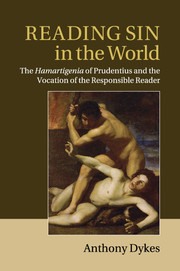Book contents
- Frontmatter
- Contents
- Acknowledgements
- Abbreviations, manuals and works of reference
- Bible texts used
- Classical texts used
- Electronic resources
- The names of biblical characters
- Vocabulary and style
- 1 Introduction: ‘Prudentius counts’
- 2 The world projects human responsibility
- 3 The vocation of the responsible reader: the biblical strategy
- 4 The vocation of the responsible reader: the genre strategy
- 5 Conclusion
- Appendix A A note on the title of the Hamartigenia
- Appendix B A brief note on the date and circulation of the Vulgate Genesis
- Bibliography
- Index
Appendix B - A brief note on the date and circulation of the Vulgate Genesis
Published online by Cambridge University Press: 03 May 2011
- Frontmatter
- Contents
- Acknowledgements
- Abbreviations, manuals and works of reference
- Bible texts used
- Classical texts used
- Electronic resources
- The names of biblical characters
- Vocabulary and style
- 1 Introduction: ‘Prudentius counts’
- 2 The world projects human responsibility
- 3 The vocation of the responsible reader: the biblical strategy
- 4 The vocation of the responsible reader: the genre strategy
- 5 Conclusion
- Appendix A A note on the title of the Hamartigenia
- Appendix B A brief note on the date and circulation of the Vulgate Genesis
- Bibliography
- Index
Summary
The question here will be whether, beyond the many choices which Prudentius makes in selecting scriptural texts, he chose between different available versions of the ‘same’ text. That is to say, in a rather bald fashion, did he choose not to use alternative versions of scripture which were available to him, but less useful for his purpose? In particular, did he choose not to use the Vulgate, or some other revised rendering of Genesis, which omitted the phrase, ‘nonne si recte offeras recte autem non dividas peccasti’ (Genesis 4.7)? This phrase is highly opportune for the way in which Prudentius develops his themes: it opens the way for presenting the division between God the Creator and God the Redeemer amongst the Marcionites; it suggests the notion of the division in the Church caused by the intrusion of heresy; it also permits the division within the Preface itself, which, as a literary construct, is presented in the form of a diptych.
Schuster, basing his argument on Prudentius's allusions to Genesis 2.7, suggests that Prudentius mixed the two Latin traditions. Salvatore would concur, but he seems unaware, as Charlet stresses, of the work of the Vetus Latina Institute of Beuron, whose edition of Genesis appeared in 1951. Amongst these scholars (and including Grasso), there seems to have been no attempt to see whether it was even possible, in terms of chronology and the probable circulation of texts, for Prudentius to be aware of Jerome's revisions of the Old Testament, either in an early version or in a version according to the veritas hebraica.
- Type
- Chapter
- Information
- Reading Sin in the WorldThe Hamartigenia of Prudentius and the Vocation of the Responsible Reader, pp. 252 - 254Publisher: Cambridge University PressPrint publication year: 2011



